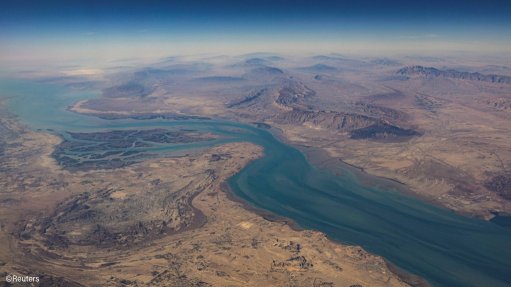Manufacturing the key to Africa’s economic future amid global instability, Maile says


Gauteng Department of Economic Development MEC Lebogang Maile
Photo by Creamer Media
Given the current global geopolitical instability, Gauteng Department of Economic Development MEC Lebogang Maile says it is becoming increasingly evident that the future of Africa lies in its ability to strengthen collaboration.
“Rethinking our place in this landscape also necessitates that we rethink how we are managing our economies and trade relations. This is the most sustainable way of absorbing the shocks that come with a global economic environment where tariff wars and competing political interests have become the new normal,” he said at the Manufacturing Indaba, in Sandton, on July 15.
Maile highlighted the changing demographic profile of Africa, noting that the continent stood at a pivotal moment in its history. With the youngest population globally and vast natural resources, the continent must craft policy and vision to address both substantial challenges and vast opportunities.
“While agriculture and raw material exports have long formed the backbone of African economies, the future lies in a sector that has fuelled the rise of every modern economy: the expansion of manufacturing is not merely a desirable goal for the continent but an essential foundation upon which Africa’s economic transformation, job creation and long-term prosperity depends,” Maile stated.
He underscored the role of manufacturing in driving industrialisation and technological progress, describing it as a sector capable of absorbing large numbers of workers, fostering innovation and creating complex value chains crucial to sustainable development.
Maile expressed concern over Africa’s continued reliance on unprocessed raw material exports, such as oil, minerals and agricultural goods, which exposed the continent to commodity price volatility and external shocks.
“Furthermore, the continent loses significant economic opportunities by primarily exporting raw materials instead of processing them locally. This practice results in lost jobs, lower revenue and stifled innovation.
“By exporting raw materials, African nations miss out on the higher profits generated by value-added products and industries,” he said.
He added that this approach entrenched economic dependency on foreign countries that imported African materials for manufacturing and exported the final goods at a profit.
In contrast, manufacturing would allow African nations to climb the value chain, diversify their economies, and reduce exposure to global market fluctuations.
Maile pointed to Africa’s population growth as a crucial factor in shaping the future of manufacturing on the continent. By 2050, Africa’s population is expected to reach 2.5-billion, with a large majority under the age of 25.
“This demographic dividend could be a blessing or a curse. It will be a blessing if the continent can provide meaningful employment opportunities for its young people, and it will be a curse if youth unemployment leads to widespread disillusionment, instability and migration crises,” he said.
He said manufacturing was well-positioned to meet the employment demands of a growing youth population. Unlike extractive industries or advanced technology sectors that often required specialised training, manufacturing could offer opportunities across various skill levels.
“Furthermore, value addition not only increases export revenues but also fosters the development of supporting industries such as packaging, transportation, marketing, and financial services.
“These interlinked sectors create a multiplier effect, generating jobs and boosting incomes across the economy. Economic diversification through manufacturing also insulates countries from external shocks and helps build resilience,” Maile said.
He cited Gauteng province as an example, with manufacturing playing a central role in the economy, contributing more than 33% to GDP. Despite a decline in its overall share, manufacturing remained one of Gauteng’s largest employers, with significant activity in the metals, petroleum and food and beverage industries.
“Of significance about the manufacturing sector is its resilience and ability to rebound even after crisis. Consider that in the second quarter of 2022, following the Covid-19 global pandemic that devastated the national economy, and where many sectors shed hundreds of thousands of jobs, with thousands of companies forced to shut down, the manufacturing sector in Gauteng employed well over 500 000 people.
“This figure represented a significant portion of the province’s real economic employment, accounting for 20% of the total,” Maile said.
He described manufacturing as a driver of technological transfer and skills development. African firms engaged in the sector gained access to new production technologies and management techniques, often through partnerships and participation in global value chains.
“Over time, local firms can move from simple assembly to more complex manufacturing, and research and development. This evolution fosters homegrown innovation—enabling Africa to move from being merely a consumer of foreign technologies to a creator of new products and solutions tailored to local needs,” Maile stated.
Turning to the issue of migration, Maile argued that instead of viewing it as a crisis, migration should be understood in relation to industrialisation. As manufacturing expands, it drives urbanisation, with people relocating in search of jobs.
“This migration stimulates the development of infrastructure such as roads, ports, electricity and telecommunications that benefit not only factories but also the wider population. Well-planned urbanisation creates hubs of innovation and productivity, spurring the growth of new industries and services,” Maile said.
He added that a thriving manufacturing sector strengthened the fiscal capacity of States through increased tax revenues, enabling greater public investment in education, healthcare and services, and contributing to long-term socioeconomic stability.
“At the moment, Africa’s share of global manufacturing output remains less than 2%, but the continent’s potential is enormous. The African Continental Free Trade Area, which seeks to create a single market of over a billion people, offers an unprecedented opportunity for manufacturers to achieve economies of scale, access new markets, and increase competitiveness,” Maile said.
He said Africa could position itself as a global supplier of a range of manufactured goods, from processed foods to electronics, provided that appropriate policy frameworks were put in place.
Still, Maile acknowledged that significant challenges remained. These included limited infrastructure, erratic power supply, financing constraints, excessive bureaucracy, and gaps in education and training systems.
“The key priorities for us must include investing in infrastructure. This is because reliable roads, ports, energy and digital networks are essential for competitive manufacturing,” Maile said.
He added that governments should also prioritise improving the business climate by removing red tape and promoting transparent governance to encourage investment and entrepreneurship.
“Additionally, we must make the building of human capital a key priority. Education and vocational training tailored to industry needs will ensure a skilled and adaptable workforce,” he stated.
He also emphasised the need to improve access to finance, especially for small and medium-sized enterprises that could drive innovation and create jobs at scale.
“Various South African banks are represented at this Manufacturing Indaba, and some of them are sponsoring this event. This relationship must be strengthened beyond the Indaba and into supporting the work of manufacturers on the continent, particularly those from historically disadvantaged communities,” Maile said.
He highlighted the importance of regional integration in realising Africa’s manufacturing ambitions. Removing trade barriers and harmonising regulations could significantly boost competitiveness and industrial growth.
“Regional integration significantly boosts manufacturing and economic development by expanding markets, fostering specialisation, and promoting innovation and efficiency,” Maile said.
He said that such integration allowed African countries to overcome the constraints of small domestic markets, benefit from economies of scale and participate more effectively in regional and global value chains.
“Africa is at a crossroads. The choices made today will determine whether the continent fulfils its promise or falls short of its potential,” Maile stated.
“Manufacturing is not a panacea – but it is the indispensable engine for economic transformation, technological progress, and broad-based prosperity.
“By embracing industrialisation, adding value to its resources, investing in its people, and integrating into the global economy, Africa can chart a course towards a future of hope, dignity, and shared success,” he said.
Article Enquiry
Email Article
Save Article
Feedback
To advertise email advertising@creamermedia.co.za or click here
Press Office
Announcements
What's On
Subscribe to improve your user experience...
Option 1 (equivalent of R125 a month):
Receive a weekly copy of Creamer Media's Engineering News & Mining Weekly magazine
(print copy for those in South Africa and e-magazine for those outside of South Africa)
Receive daily email newsletters
Access to full search results
Access archive of magazine back copies
Access to Projects in Progress
Access to ONE Research Report of your choice in PDF format
Option 2 (equivalent of R375 a month):
All benefits from Option 1
PLUS
Access to Creamer Media's Research Channel Africa for ALL Research Reports, in PDF format, on various industrial and mining sectors
including Electricity; Water; Energy Transition; Hydrogen; Roads, Rail and Ports; Coal; Gold; Platinum; Battery Metals; etc.
Already a subscriber?
Forgotten your password?
Receive weekly copy of Creamer Media's Engineering News & Mining Weekly magazine (print copy for those in South Africa and e-magazine for those outside of South Africa)
➕
Recieve daily email newsletters
➕
Access to full search results
➕
Access archive of magazine back copies
➕
Access to Projects in Progress
➕
Access to ONE Research Report of your choice in PDF format
RESEARCH CHANNEL AFRICA
R4500 (equivalent of R375 a month)
SUBSCRIBEAll benefits from Option 1
➕
Access to Creamer Media's Research Channel Africa for ALL Research Reports on various industrial and mining sectors, in PDF format, including on:
Electricity
➕
Water
➕
Energy Transition
➕
Hydrogen
➕
Roads, Rail and Ports
➕
Coal
➕
Gold
➕
Platinum
➕
Battery Metals
➕
etc.
Receive all benefits from Option 1 or Option 2 delivered to numerous people at your company
➕
Multiple User names and Passwords for simultaneous log-ins
➕
Intranet integration access to all in your organisation


















